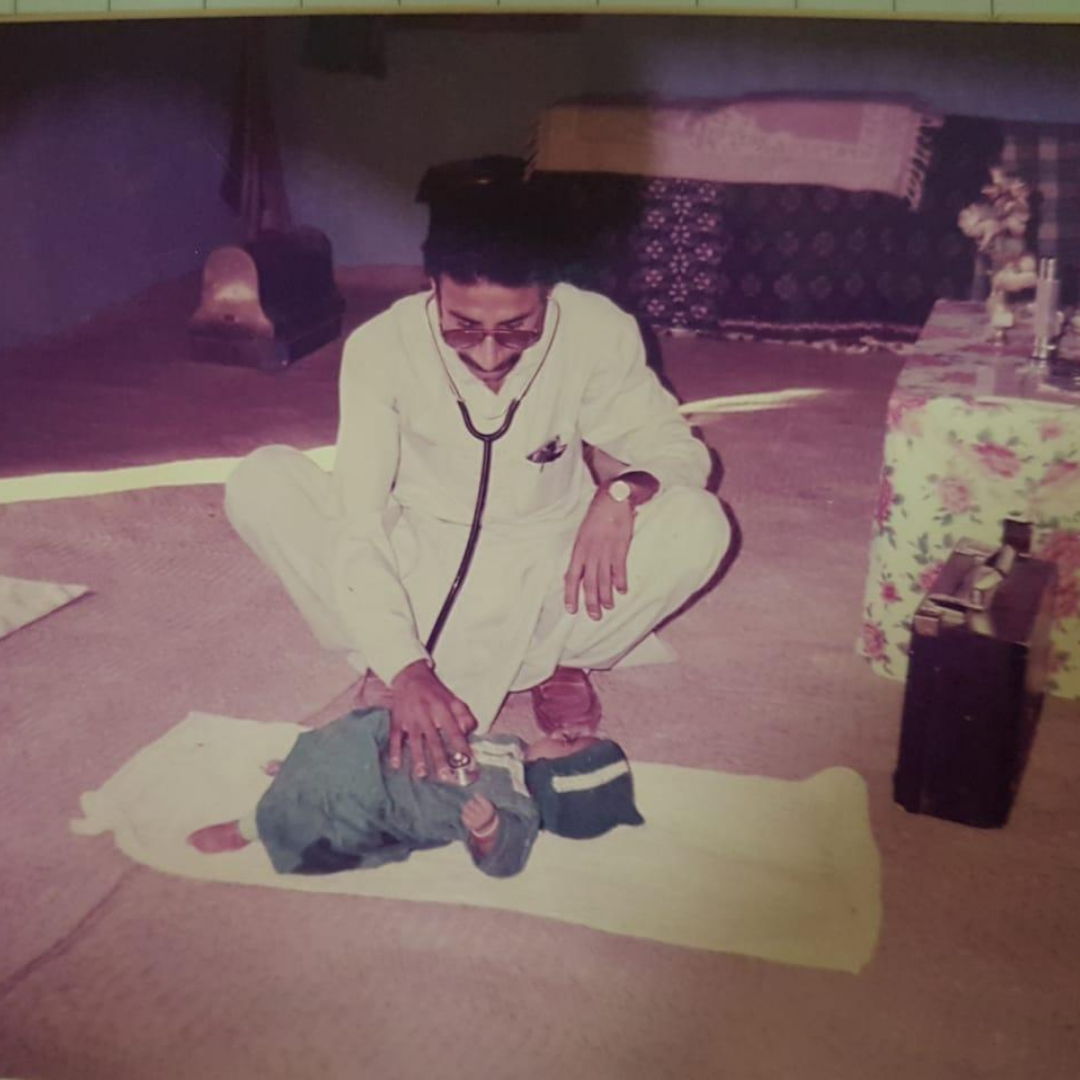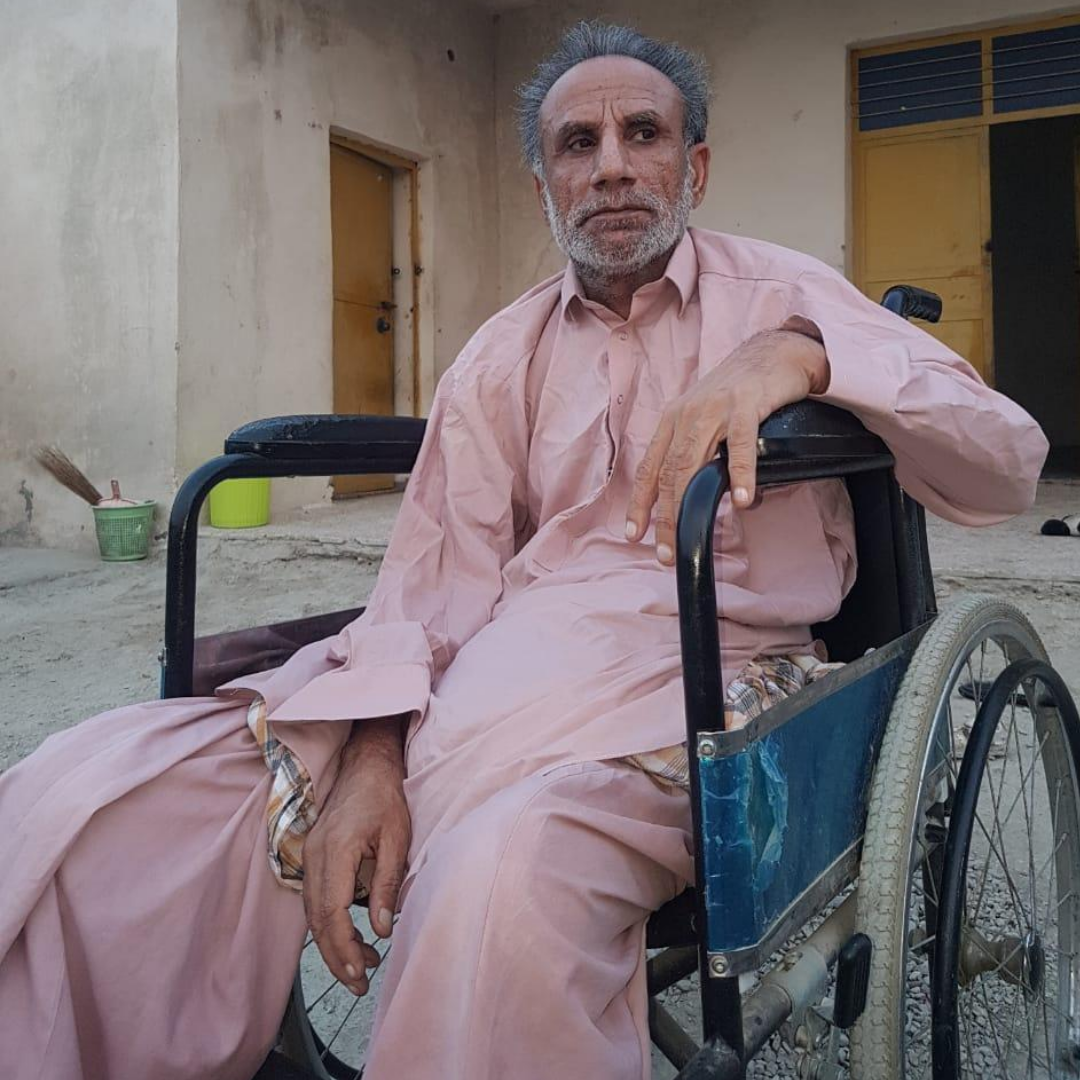Dr Ghulam Rasool: A messiah left paralysed
Dr Ghulam Rasool, once a charming, ambitious physician in the metropolis of Karachi, has been paralyzed for years now and is currently on a wheelchair. The people of the Dasht village in Balochistan´s district Kech know Dr Ghulam Rasool as a messiah who had left Karachi to open a private clinic in their village in the 1990s. The area does not have electricity, running water or any other modern facilities and hence even doctors who are posted by the government rarely appear on their duties in this area. Before Rasool shifted from Karachi to Dasht, the residents of the area had to travel 82 kilometers to Turbat for a routine medical visit and since the closure of his clinic they have to travel the same distance once again.
He was raised and educated in Karachi, the capital city of Sindh. His mother says Rasool was born during the India-Pakistan war of 1965. That is approximately five years after his parents abandoned their village in Dasht and settled in Karachi in the 1960s.
In 1993, he was a fresh medical graduate when his cousin Rasool Bakhsh fell ill and had to be shifted from Dasht to Karachi for treatment. The doctors diagnosed him with cancer and prescribed him an injection per day for three months.
When Rasool Bakhsh insisted on returning to Dasht, Dr Ghulam Rasool’s father sent him along with the patient. “He said, go visit your relatives and also take care of your cousin with the treatment,” Ghulam Rasool recalls.
After arriving in Dasht and witnessing the living conditions of the people, Ghulam Rasool decided to stay in the village and offer his medical services to the much-needy people.
“My father was not happy with my decision but I had already made up my mind, I could not abandon the people. The healthcare system (in Balochistan) was poor. Majority of the children were malnourished. Maternal mortality rate was very high. I saw people dying of Malaria and diarrhea. How could I turn my back on them? They needed me. So I stayed.”
Ghulam Rasool built a one-room mud house with the help of the local people. The room served as both a living room and a clinic, divided by a thin fabric sheet. A few years later, he upgraded the clinic and built two more rooms to accommodate more patients.
Dr Ghulam Rasool´s son Yasir recalls: “It was not a clinic in a sense. There was no opening and closing times. As there were no transportation means, people from other villages who couldn’t bring their sick ones to the clinic, came to take father with them on house visits, sometimes in the middle of night. It was a kind of mobile medical service. But in return, he earned love and respect. Most importantly his devotion to his job and commitment to his people is unmatched. I never saw him complaining”.
In 2014, Pakistan and China signed a multi-billion-dollar agreement known as the China-Pakistan Economic Corridor (CPEC). A link road was added in the project which passes through Dasht, connecting Iran with Pakistan. Nationalist forces opposed it and declared it a colonial project which they said will add to the exploitation of the common people at the hands of the military in Balochistan.
In December 2015, a large number of military forces was deployed for the security of the project. On December 22, 2015, the military carried out an operation to take control of the area where the road was expected to be built. Many people were killed in that operation.
“The military used excessive force without discrimination between combatants and non-combatants. Thousands of people were forcibly disappeared and killed, most of them were civilians and political activists. The military´s indiscriminate policies compelled people to take up arms against ruthless operations across Balochistan”, Dr Ghulam Rasool tells us.
One night in early 2016, four men brought an injured militant to Dr Ghulam Rasool’s clinic. He was injured during a military operation. “He was critically injured. I had two choices. Either let him bleed to death or treat him. I chose the latter”, said Dr Ghulam Rasool. “My profession demands neutrality regardless of someone´s affiliation, belief or ethnicity. As long as someone needs medical help, I have to offer it. That is my job and I was only doing my job”, he added.
With military operations and army brutality increasing, a growing number of civilians appeared in the clinic for treatment, majority of whom were victims of torture who were illegally abducted and interrogated by the military during these operations. Some were kept for days in torture cells, others for months.
Dr Ghulam Rasool caught the eyes of the military. On March 6, 2016, when he had left his house for a home visit to one of his patients, the forces raided his house. They tortured his wife upon not finding him at home and took all the valuables, including gold and money.
Since then, the doctor has had to live a life like that of a fugitive.
“How many raids have the military conducted to arrest you”?
“I have lost count. I have been on the run since the first raid. Whenever my relatives bought ration for my family, the military would raid my house on the pretext of searching for me. They would take away the ration and other valuables, including the women´s clothes and the children’s toys.”
Nearly one year after the first raid, on February 27, 2017, the forces raided his house for one last time. They burnt down his home and the clinic.
Mr Rasool decided, like many other residents, to migrate with his family to the other side of the border which cuts the historical region of Balochistan into Iran and Pakistan. He tried to start a new life but on July 26, 2018, unknown gunmen shot him multiple times lodging five bullets into his body one of which hit his spinal cord and left him paralyzed. Dr Rasool and his family believe that the gunmen were Pakistan military-paid goons, locally known as death squads.
On August 22, 2019, once again unknown gunmen shot dead three more members of his family, Ishaq Rasool Bakhsh, Zubair Jan Habib and Abdul Waheed Moldad. Ishaq was the son of Rasool Baksh who had died of cancer. When Ishaq’s father died, he was only three months old. Dr Ghulam Rasool raised him and his sister.
“The attackers were Pakistan army-sponsored death squad members. We all know them. It is not an accusation, we have identified the killers”, claimed Yasir. “The army always had the same policy to silence dissent i.e. to kill them. They have failed in the past to suppress us and will fail in the future as well”, he added.
Dr Rasool said: “Ishaq was my son. The dearest one. What was his guilt other than being my son. Do you think he deserved to be killed in his early 20s because he is my son? This state (Pakistan) has occupied our land, imposed policies that serve the military establishment and the elites in Punjab and when we differ or ask for our rights, they kill us.”
However, he remains strong in his beliefs. “The state has the power to kill us, loot us and deprive us but they cannot enslave our thoughts and our dreams, dreams of a better future and a free society where everyone could live in peace and with dignity”, he said.
Dr Rasool started to rebuild the house after it was burnt down. On May 26, 2020, the military forces once again destroyed his house. This time they bulldozed it instead of burning.


